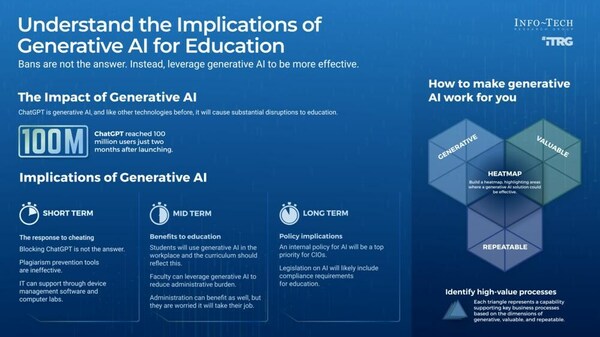IT plays a crucial role in assisting educational leaders to maximize the potential of generative AI and improve student outcomes.
TORONTO, May 3, 2023 /PRNewswire/ – Generative AI, a powerful technology known for content creation and discovery, has gained significant attention in recent months. Its use within the education sector has raised concerns, especially in relation to cheating. Educational institutes are struggling to address these challenges: plagiarism prevention tools are ineffective, and blocking AI tools such as ChatGPT is not a viable option. To help IT professionals support educational leaders in navigating the challenges posed by generative AI and harnessing its potential to enhance education, Info-Tech Research Group has released its new advisory deck, titled Understand the Implications of Generative AI in Education.

Info-Tech’s resource highlights ChatGPT as a standout generative AI tool that goes beyond standard chatbots, creating new content based on user inputs rather than just executing basic workflows. However, ChatGPT has been blocked by several prominent institutions, preventing innovative teachers from using this tool for increased productivity. Additionally, plagiarism prevention tools commonly used by educational institutions present privacy issues and may result in a breakdown of trust. This mistrust can go both ways, as students may question the validity of their instructors’ feedback, just as instructors often question the quality of students’ writing.
“Generative AI technology can potentially transform the classroom just as calculators, the internet, and digital assets changed how we taught and learned in the past,” says Mark Maby, research director at Info-Tech Research Group. “Educators may have no choice but to embrace generative AI and leverage its strengths to enhance learning and development.”
The firm advises a positive approach for the use of generative AI tools in education: Rather than banning them, institutions can use the tools to benefit the educational sector. One way to achieve this is by encouraging students to take ownership of their writing by using an AI tool to learn editing skills while personalizing their output. Faculty members can leverage generative AI to reduce administrative burdens and focus on other important aspects of teaching, ultimately improving student learning outcomes. Generative AI can also be used as a 24/7 chatbot to answer questions from prospective students of post-secondary institutions about the admissions process, academic programs, and campus life, reducing the workload of admissions officers and providing a cost-effective solution for managing the intake process.
In the new advisory deck, Info-Tech recommends that IT leaders in educational institutions implement the following framework to determine how they can use generative AI most effectively:
Review the business capability map for high-value processes.
- Identify capabilities that support key business processes.
- Build a heatmap to highlight areas where a generative AI solution could be effective, using a framework to determine if a process is repeatable, generative, and valuable.
Conduct a basic cost-benefit analysis for the tech.
- Choose the most suitable process and capability for generative AI intervention.
- Outline a high-level business case that answers how generative AI would reduce manual work. Consider what its output would look like, what the expected benefit would be, what the potential drawbacks are, and how much it would cost.
Explore the vendor landscape:
- Identify crucial functionalities and integrations that AI solutions must have.
- Review different generative AI options available on the market that can be purchased for enterprise use.
- Compare requirements with options, then select a solution and begin piloting.
Educational leaders are encouraged to remember that virtual assistants may not always provide accurate and reliable responses, especially in situations involving complex or sensitive information.
For additional insights on the use of AI in education, download the Understand the Implications of Generative AI in Education advisory deck.
For more information about Info-Tech Research Group or to access the latest research, visit infotech.com and connect via LinkedIn and Twitter.
About Info-Tech Research Group
Info-Tech Research Group is one of the world’s leading information technology research and advisory firms, proudly serving over 30,000 IT professionals. The company produces unbiased and highly relevant research to help CIOs and IT leaders make strategic, timely, and well-informed decisions. For 25 years, Info-Tech has partnered closely with IT teams to provide them with everything they need, from actionable tools to analyst guidance, ensuring they deliver measurable results for their organizations.
Media professionals can register for unrestricted access to research across IT, HR, and software and over 200 IT and industry analysts through the Media Insiders program. To gain access, contact pr@infotech.com.
SOURCE Info-Tech Research Group

View original content to download multimedia:








Leave a Reply